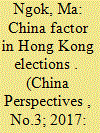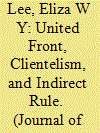| Srl | Item |
| 1 |
ID:
156080


|
|
|
|
|
| Summary/Abstract |
The China factor has always been a significant structural, ideological, and organisational factor in Hong Kong elections. Since 2003, the deepening of intervention by Beijing and its Liaison Office in Hong Kong meant that the China factor as an organisational force became increasingly salient in elections. It also drove more people, especially young people, to resist China’s control and take the road of supporting independence or self-determination. The 2016 elections showed more ostensible intervention by the Liaison Office, and independence became a new campaign issue. The China factor will continue to be an integral part of Hong Kong elections in years to come.
|
|
|
|
|
|
|
|
|
|
|
|
|
|
|
|
| 2 |
ID:
173263


|
|
|
|
|
| Summary/Abstract |
United front organizations in Hong Kong have evolved into a form of patron-client network, with the Liaison Office of the Central People’s Government in the Hong Kong Special Administrative Region (Liaison Office) assuming the role of the patron. Possessing the capacity to penetrate into the community and offer patronage goods, these organizations have become the basis for the Liaison Office to build a political machine, discipline elites and maintain their cohesion, control the executive, and counterbalance civil society. The closely knit clientelist network functions as a para-party machinery, supporting the Liaison Office to operate as a quasi-ruling party. On the other hand, immense social resentment has culminated over the Chinese party-state’s (party-state’s) infringement on the autonomy of the Hong Kong Special Administrative Region (HKSAR).
|
|
|
|
|
|
|
|
|
|
|
|
|
|
|
|